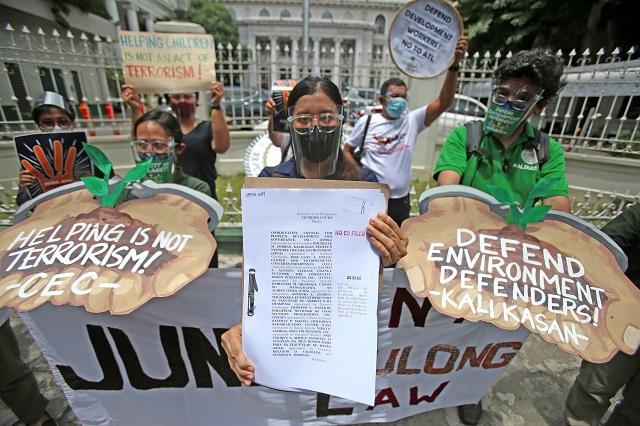Anti-terror law endangers development, humanitarian work, groups tell Supreme Court

More civil society groups have asked the Supreme Court (SC) to strike down the anti-terrorism law as unconstitutional, saying some of its provisions will endanger developmental and humanitarian work.
Eleven organizations, including the Coordinating Council for People's Development and Governance, Inc., the Kalikasan People's Network for the Environment, and IBON Foundation, filed at least the 33rd petition against the controversial new law on Friday.
They said Republic Act No. 11479, or the Anti-Terrorism Act of 2020, must be declared null and void in its entirety for "being contrary to the Constitution."
The petitioners said that many of their organizations have been tagged by the government as communist fronts even before the anti-terrorism law was enacted.
With this new law, they said they expect more human rights violations to take place, hence their plea to the highest Philippine court to stop its enforcement.
In addition, they claimed that the law will "legitimize" and "ultimately justify" threats, harassment and intimidation against development workers.
Because the law criminalizes providing "material support" to terrorists, the petitioners said they feared that their developmental and humanitarian work may be impeded as their programs may be construed as "support for terrorist activities."
"The petitioners and other similar organizations whose main trust is to empower the poor and marginalized sectors so that they can genuinely participate in all aspects of public policy, programs and projects will become targets of state forces who could wield this law as a weapon against them," they said.
"They will surely be unjustly treated and be subjected to government’s annoyance, ridicule, threats, and discrimination and ultimately, their lives and liberty will be at stake," they added.
They also shared the prevailing view among the critics of the law that it will violate basic rights, such as the freedom of speech and association, and discourage activism.
The SC counts the new petition as the 33rd; two more petitions reported by the media were filed via registered mail and have yet to be included in the court's official list of petitions.
The new law, which replaced the Philippines' old anti-terrorism legislation, the Human Security Act of 2007, has been challenged by various sectors, ranging from retired justices to youth leaders.
The SC said it will conduct oral arguments on the case but has not yet announced details. — Nicole-Anne C. Lagrimas/RSJ, GMA News



